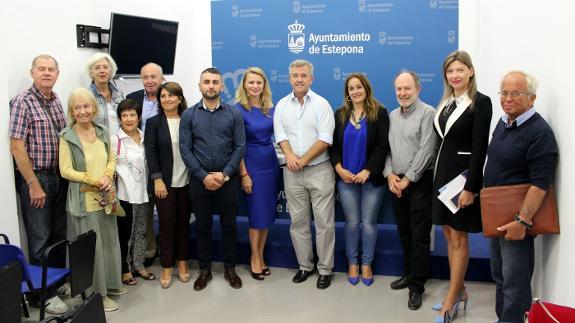Interpreter service introduced at Estepona schools
Volunteers will now help parents of foreign pupils to communicate with teachers
CHARO MÁRQUEZ
Miércoles, 27 de febrero 2019, 17:00
A meeting with your child's teacher can be a positive experience, and a useful way to keep communication flowing. However, some parents find it difficult because they don't speak much Spanish. Schools in Estepona have a large number of foreign pupils and they naturally learn the language, but the same cannot be said for many of their mothers and fathers.
With this in mind, the town hall has set up an initiative to provide interpreters for people who don't speak Spanish, when they have to attend meetings with their children's teachers or tutors. So far 15 volunteers have signed up to provide this service, covering ten languages: English, French, Russian, Polish, Romanian, Bulgarian, Norwegian, Hungarian, Ukrainian and Arabic.
The mayor of Estepona, José María García Urbano, who presented this new project this week, explained that it will enable people to have a better grasp of how their children are doing at school, and will help them to find out whether they need extra assistance or support.
The interpreter service will be available in all the junior schools immediately, and in forthcoming weeks it will be extended to secondary schools as well.
The mayor pointed out that there is a "social dimension" to the project as well, "because it means we are solving a problem for foreign residents who need to speak to their children's teachers but find it hard to do so because of the language barrier".
To raise awareness of this new facility the council has produced an information poster in each of the ten languages, and these are being given to the parents of children of those nationalities.
From now on, every time a meeting is scheduled between these parents and their children's teacher, the school will contact the relevant volunteer so they can also attend the meeting as interpreter.
The head teachers of the Sierra Bermeja and Mar de Alborán schools, Irene Martín and Antonio Sánchez, respectively, say they welcome this initiative because although in their experience children from other countries usually integrate easily and quickly learn Spanish, their parents find it more difficult. They believe the scheme will benefit teachers and parents alike, and hope it will grow and expand in the future.
Solidarity
David Milne Gordon, one of the volunteer interpreters, also stresses the importance of this project and says he is convinced not only that it will be successful in Estepona but that it will also be introduced in other towns.
The mayor says that Estepona "has always been an open, multicultural town which shows solidarity towards those who need help", so he is sure this initiative, which has been organised by the Foreign Residents Department and the Education Department at the town hall, will be instrumental in assisting residents of different nationalities to integrate.
At the presentation of the new service, he also took the opportunity to congratulate the interpreters for their "magnificent work", because for several decades volunteers have been providing this service to foreign residents at the local health centres as well.
